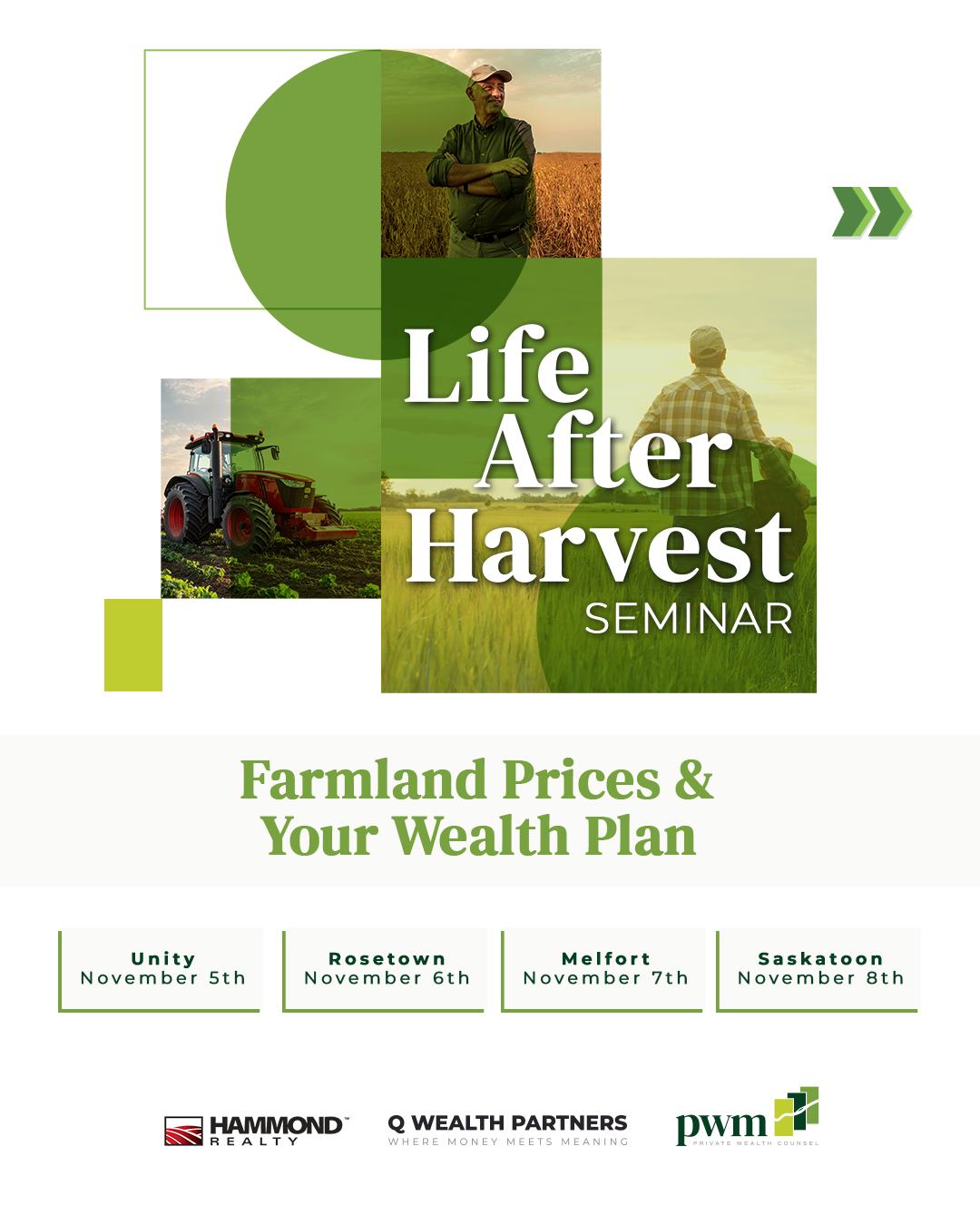
Life After Harvest
When the last truck leaves the yard and the dust settles, most farmers finally have a moment to think. The fields are quiet,and for the first time in months, so are we. That’s when the deeper questions show up, not about yield, but about what comes next.
Over the past few months, I’ve joined Kevin Hegedus and Andrew Rodych from PWM Private Wealth on the Money Sense radio show. Together, we’ve explored what happens after the farming years, how to think about farmland, family, and freedom in new ways. Those conversations reminded me that the biggest decisions in farming aren’t always made in the field; they’re made around the kitchen table.
A Quiet Shift
Across Saskatchewan, a quiet shift is taking place. More retired farmers who’ve rented out their land for years are deciding to sell. Not because they have to, but because they’re ready to.
For decades, many held on, thinking the next generation might farm it or want it. But land values are at historic highs, rental returns have dropped, and uncertainty around future tax rules has people asking new questions. What once felt unthinkable is now being considered with fresh eyes.
Selling farmland is never just about the numbers. Every acre holds stories — of grandparents who broke the prairie, parents who persevered through droughts, and families who built something from nothing. For many, selling feels like letting go of that history. But it’s not about letting go, it’s about what comes next.
Unlocking Value
I’ve learned through thousands of farmland transitions that maximizing value and unlocking value aren’t the same thing.
Maximizing value is about getting the highest price. Unlocking value is about what that sale enables: freedom of time, money, relationships, and purpose.
Turning land into liquidity can open doors. It lets families invest, travel, help children, or simplify estates. It can reduce stress, balance fairness, and bring peace of mind. But clarity must come first. The biggest mistake is selling without knowing what you want your next chapter to look like.
As Kevin often says, “If you don’t know what the capital is for, you can’t know what to do with it.” That’s exactly what we’ll explore this November at our Life After Harvest Seminar Series — how farmland, financial, and family decisions can work together to create confidence.
Perspective Matters
Farmland has been one of the most stable and rewarding assets of the past century, but history reminds us that markets move in cycles. After 25 years of strong appreciation, we may be entering a new phase, not a crisis, but a turning point.
The real question isn’t what’s it worth today? It’s how does it fit into the bigger picture of what I want for my life, my family, and my legacy? That’s the kind of perspective that helps farmers make decisions with clarity, not emotion.
The Next Season
Farmers are planners by nature. We plan for weather, for markets, and for the next crop. But few plan for the years after the final harvest, the years when purpose shifts and time opens up.
For some, that next season means mentoring the next generation. For others, it’s travel, volunteering, or simply mornings at the kitchen table with coffee and no deadlines. You don’t stop being a farmer when you stop farming. You just start tending to a different kind of field, one made of relationships, time, and freedom.
Closing Thought
Life after harvest isn’t the end of something. It’s the beginning of something earned, a season of clarity, gratitude, and possibility.
If you’re standing at that crossroads, start the conversation. Talk with your family. Talk with your advisors. Join us this November at one of the Life After Harvest Seminars. Because your next chapter deserves the same care and intention you’ve always given the land.
In the end, the land teaches us more than we teach it. And maybe what it’s teaching now is how to let go, not to lose, but to live.
If you are interested in attending, here's what we will cover:
- What history tells us about current farmland values
- Options for transitioning, renting, or selling your farm
- When to consider incorporation or restructuring
- How tax planning can protect wealth
- Building a financial plan for life beyond farming
Seminar Series Schedule:
📍 Unity — Wed, Nov 5 | New Horizons Hall | 7:00–9:00 pm (registration 6:30 pm)
📍 Rosetown — Thu, Nov 6 | Rosetown Civic Centre | 7:00–9:00 pm (registration 6:30 pm)
📍 Melfort — Fri, Nov 7 | Canalta Melfort Hotel | 7:00–9:00 pm (registration 6:30 pm)
📍 Saskatoon — Sat, Nov 8 | Sheraton Cavalier Hotel | 9:30–11:30 am (registration 9:00 am)
☕ Coffee and refreshments will be served.
👪 Family members are encouraged to attend.
Seats are free, but space is limited at each location. Please register early to reserve your spot.



.png)
